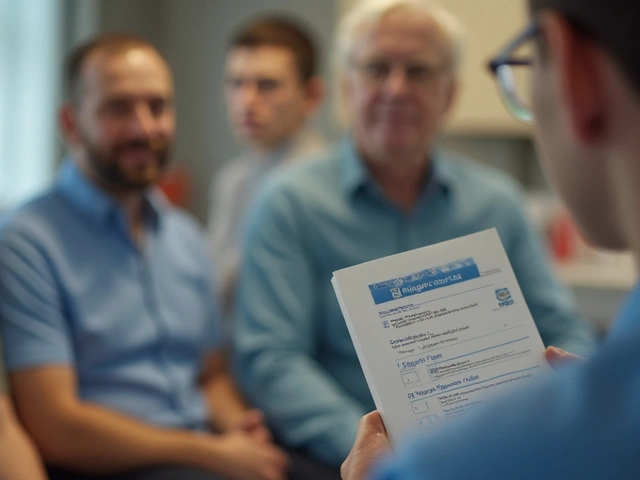For people living with inflammatory bowel disease (IBD), diarrhea isn’t just inconvenient-it’s exhausting, embarrassing, and sometimes life-limiting. Crohn’s disease and ulcerative colitis can turn daily routines into minefields. You plan your day around bathrooms. You avoid travel, social events, even work meetings. And when flare-ups hit, over-the-counter meds often don’t cut it. That’s where loperamide comes in. It’s not a cure. It doesn’t calm inflammation. But for many with IBD, it’s one of the few tools that actually gives them back control.
What Is Loperamide, Really?
Loperamide is the active ingredient in Imodium and other generic anti-diarrheal brands. It’s an opioid receptor agonist, but don’t let that scare you. Unlike morphine or codeine, it barely crosses the blood-brain barrier. That means it doesn’t cause euphoria or addiction under normal use. Instead, it works right where it’s needed: in the gut.
When you take loperamide, it slows down the muscle contractions in your intestines. That gives your body more time to absorb water and electrolytes from stool. The result? Fewer bowel movements, firmer stools, less urgency. For someone with IBD, that’s not just comfort-it’s dignity.
The FDA approved loperamide in 1976. Since then, it’s been used by millions. A 2023 study in the Journal of Crohn’s and Colitis tracked 1,200 IBD patients using loperamide for symptom control. Nearly 70% reported significant improvement in stool frequency and quality of life, with no increase in flare-ups.
Why Do IBD Patients Turn to Loperamide?
IBD causes inflammation in the lining of the gut. That inflammation damages the cells that absorb water. It also messes with nerve signals that control bowel movement speed. The outcome? Chronic, unpredictable diarrhea. Even during remission, some people still struggle with loose stools.
Antibiotics? They can make diarrhea worse by killing off good bacteria. Steroids? They help with inflammation but come with serious side effects if used long-term. Immunosuppressants? They target the root cause but take weeks to work. Loperamide? It kicks in within an hour. It’s fast, cheap, and doesn’t interfere with other IBD meds.
Many patients use it as needed-not daily. One woman in Melbourne told me she keeps a bottle in her purse. If she feels a flare coming on before a meeting, she takes one tablet. No more panic. No more canceled plans. Just normalcy.
How to Use Loperamide Safely with IBD
It’s not a free pass. There are rules.
- Start low. Take one 2 mg tablet after the first loose stool. Only take a second 2 mg dose if needed. Don’t exceed 8 mg in 24 hours unless directed by a doctor.
- Don’t use it daily. Long-term daily use can mask worsening inflammation. If you’re taking it more than three times a week for over two weeks, talk to your gastroenterologist.
- Avoid it during active flare-ups with fever or blood in stool. Loperamide can trap toxins and bacteria in the gut, increasing the risk of toxic megacolon-a rare but life-threatening complication.
- Stay hydrated. Diarrhea depletes fluids and electrolytes. Drink water, broth, or oral rehydration solutions. Don’t rely on loperamide to fix dehydration.
- Watch for side effects. Constipation, dizziness, and bloating are common. Rarely, it can cause heart rhythm issues if taken in very high doses. Never exceed 16 mg in a day.
There’s no one-size-fits-all dose. Some people need only 2 mg every other day. Others need 4 mg after every meal during a flare. Work with your doctor to find your sweet spot.

What Loperamide Can’t Do
It’s important to be clear: loperamide treats symptoms, not the disease. It won’t heal ulcers. It won’t reduce inflammation. It won’t prevent future flares. If you’re using it to avoid seeing your doctor, you’re putting yourself at risk.
IBD is a systemic condition. Left untreated, it increases the risk of colon cancer, malnutrition, and bone loss. Loperamide is a bandage-not the surgery. If your diarrhea is getting worse despite using loperamide, it’s a red flag. Your IBD may be progressing. Time to revisit your treatment plan.
Alternatives to Loperamide for IBD Diarrhea
Not everyone responds to loperamide. Some people get constipated. Others find it doesn’t help enough. Here are other options:
| Option | How It Works | Pros | Cons |
|---|---|---|---|
| Loperamide | Slows gut motility | Fast-acting, cheap, widely available | Can mask worsening disease; risk of constipation |
| Cholestyramine | Binds bile acids | Great for bile acid diarrhea (common after ileal resection) | Can interfere with other meds; chalky taste |
| Eluxadoline | Targets gut opioid receptors | Specifically approved for IBS-D; may help some IBD patients | Expensive; risk of pancreatitis; requires prescription |
| Dietary changes | Reduces irritants | No side effects; supports gut healing | Slow results; doesn’t work for everyone |
| Probiotics (e.g., VSL#3) | Restores gut flora | Helps maintain remission | Effects vary; not reliable for acute diarrhea |
Cholestyramine is often overlooked. If your diarrhea is worse after meals or fatty foods, bile acid malabsorption might be the culprit. A simple test can confirm it-and cholestyramine can be a game-changer.
Eluxadoline is newer and more expensive. It’s FDA-approved for IBS-D, but some gastroenterologists prescribe it off-label for IBD patients who don’t respond to loperamide. It’s not for everyone, but it’s worth discussing if other options fail.

When to Stop Using Loperamide
There are clear signs you should stop-and call your doctor.
- Your stools turn bloody or black
- You develop a fever above 38°C
- You feel bloated, swollen, or in severe abdominal pain
- You haven’t had a bowel movement in over three days
- You feel dizzy, faint, or notice your heart racing
These aren’t side effects-they’re warning signs. Toxic megacolon, bowel obstruction, or cardiac issues can sneak up fast. Don’t wait. Get checked.
Real Stories, Real Results
James, 34, has had ulcerative colitis since he was 19. He used to miss work every other week. He tried everything: steroids, biologics, diet changes. Nothing stopped the diarrhea. Then his doctor suggested loperamide-just 2 mg after breakfast and dinner. Within days, he went from 8 bowel movements a day to 2. He started biking again. Took his first flight in five years. "It didn’t fix my colitis," he says. "But it let me live with it."
That’s the truth. Loperamide isn’t magic. But for people with IBD who’ve lost control over their bodies, it’s a lifeline.
Can I take loperamide every day for my IBD diarrhea?
Daily use isn’t recommended unless under close medical supervision. Loperamide masks symptoms but doesn’t treat inflammation. Using it long-term without checking your disease activity can delay necessary treatment and increase risks like toxic megacolon. If you need it daily for more than two weeks, talk to your gastroenterologist.
Does loperamide make IBD worse?
No, loperamide doesn’t cause inflammation or worsen IBD directly. But it can hide worsening symptoms. If your diarrhea suddenly stops but you still have pain, fever, or fatigue, your disease might be progressing. Always monitor your full symptom picture-not just bowel movements.
Is loperamide safe with biologics like Humira or Remicade?
Yes, loperamide has no known dangerous interactions with biologics used for IBD. Many patients take both safely. However, always tell your doctor about all medications you’re using, including over-the-counter ones. They’ll check for rare interactions and ensure your treatment plan stays balanced.
Can children with IBD use loperamide?
Loperamide is not approved for children under 6 years old. For older children and teens, it can be used cautiously under a pediatric gastroenterologist’s guidance. Dosing is based on weight, and the risk of side effects like constipation or dizziness is higher in younger patients. Never give it to a child without medical advice.
What’s the difference between loperamide and Pepto-Bismol for IBD?
Loperamide slows gut movement to reduce stool frequency. Pepto-Bismol (bismuth subsalicylate) coats the gut lining, reduces inflammation slightly, and kills some bacteria. It’s better for traveler’s diarrhea or mild food poisoning. For chronic IBD diarrhea, loperamide is more effective. Pepto-Bismol can also cause black stools and tinnitus with long-term use, making it less ideal for ongoing management.
Next Steps for IBD Patients
If you’re struggling with diarrhea and think loperamide might help:
- Keep a symptom diary for two weeks. Note stool frequency, consistency, diet, stress levels, and medication use.
- Talk to your gastroenterologist. Bring your diary. Ask if loperamide is appropriate for your type of IBD and current disease state.
- If approved, start with the lowest dose. Don’t rush to increase it.
- Re-evaluate after two weeks. Is it helping? Are you having side effects? Are your other symptoms improving?
- Don’t stop seeing your doctor just because you feel better. Loperamide helps you live with IBD-but not without monitoring.
IBD is complex. But managing its symptoms doesn’t have to be a battle alone. Loperamide isn’t the whole answer-but for many, it’s the missing piece that lets them breathe again.







John Concepcion
November 1, 2025 AT 11:00Loperamide? Bro, it’s just a band-aid for people too lazy to fix their gut. I’ve seen guys on this stuff like it’s candy-20mg a day, no doctor, no brain. You think you’re managing IBD? Nah, you’re just hiding from it until your colon turns into a time bomb.
Caitlin Stewart
November 2, 2025 AT 21:38I’ve been using loperamide for 7 years with Crohn’s. It’s not perfect, but it’s the only thing that lets me leave the house without panic. I take 2mg after breakfast and dinner-never more. My doc knows. I track everything. It’s not magic, but it’s dignity.
And yes, I still see my gastroenterologist every 3 months. This isn’t a substitute for care-it’s a tool in the toolkit.
Alex Sherman
November 3, 2025 AT 12:15It’s fascinating how people treat pharmaceuticals like grocery items these days. Loperamide is an opioid agonist-yes, technically-and yet somehow, it’s become the go-to for anyone who doesn’t want to face the reality of their chronic illness. The normalization of symptom suppression over true healing is a cultural tragedy.
And don’t get me started on the fact that this is sold over the counter. We’ve turned medicine into a convenience store aisle. Where’s the responsibility?
Emmalee Amthor
November 3, 2025 AT 20:35im not a doctor but i think loperamide is kinda like putting a sticker on a leaking pipe. yeah it stops the drip for a bit but the pipe is still busted. i used it for a year after my colectomy and it helped me sleep again but then i started getting dizzy and my heart did that weird flutter thing and i was like… maybe i should stop being dumb and go see someone.
now i take bile acid binders and my life is 10x better. loperamide saved me at first but it almost killed me later. dont be me.
Leslie Schnack
November 5, 2025 AT 05:57What’s the typical half-life of loperamide in IBD patients? I’ve read conflicting info-some say 10 hours, others say up to 15. Does inflammation affect its metabolism? Also, does it interact with any common probiotics like Saccharomyces boulardii? I’m trying to build a regimen and want to be precise.
Pritesh Mehta
November 5, 2025 AT 17:23Let me tell you something about Western medicine-this entire discussion is a symptom of a broken system. In India, we don’t just pop pills for diarrhea. We use turmeric, ginger, pomegranate peel, and fasting. Ancient wisdom, not corporate pharmaceuticals. Loperamide? A $2 chemical crutch for people who don’t have the discipline to eat right or meditate.
And yet, you Americans pay $12 for a bottle and call it progress. Ironic. Your bodies are broken because your souls are distracted. You need mindfulness, not morphine derivatives disguised as OTC relief.
Billy Tiger
November 6, 2025 AT 11:33LOPERAMIDE IS A TRAP. EVERYONE KNOWS THIS. YOU THINK YOU’RE GETTING CONTROL BUT YOU’RE JUST WAITING FOR TOXIC MEGACOLON TO HIT. I’VE SEEN IT. MY BROTHER. 32. TOOK 16MG A DAY FOR 3 MONTHS. NO DOCTOR. JUST GOT UP ONE MORNING AND COULDN’T BREATHE. HOSPITAL. SURGERY. COLON GONE.
STOP GLOWING UP DRUGS THAT KILL YOU SLOWLY. THIS POST IS DANGEROUS.
Katie Ring
November 7, 2025 AT 09:10There’s something deeply poetic about using a drug that binds to opioid receptors to quiet the chaos of a body that’s been at war with itself for years. We don’t just treat diarrhea-we treat the grief of losing autonomy. Loperamide doesn’t heal, but it gives you back the silence between bowel movements. That silence? That’s where peace lives.
It’s not a cure. But it’s a kind of mercy.
Adarsha Foundation
November 8, 2025 AT 08:19I’ve been on loperamide for 5 years with UC. It’s helped me keep my job, travel to see family, and not cry in public bathrooms. I agree with the safety points in the post-low dose, occasional use, monitor symptoms.
I also use a low-FODMAP diet and probiotics. It’s not one thing that fixed me-it’s layers. I think that’s the real takeaway. No single pill is the answer, but loperamide? It’s a really good layer.
Oliver Myers
November 8, 2025 AT 09:41Thank you for writing this with so much care and clarity. I’ve been living with Crohn’s for 12 years, and this is the first time I’ve seen someone explain loperamide without either glorifying it or demonizing it. The balance here is rare.
I take 2mg after meals during flares, and I’ve kept a symptom journal since 2020. My doctor says I’m doing everything right. It’s not glamorous, but it’s real. And it’s allowed me to hold my daughter without worrying about where the nearest bathroom is.
You’ve given people hope-and practicality. That’s everything.
Saumyata Tiwari
November 8, 2025 AT 11:46Of course Americans rely on pills. They don’t have real culture. In India, we have Ayurveda, yoga, fasting, and spiritual discipline. You don’t need loperamide-you need to purify your karma. Diarrhea is a sign of inner imbalance. You think a chemical can fix that? Pathetic. Your entire medical system is built on illusion.
And why are you even talking about this? You’re too distracted by consumerism to heal. Take a walk in nature. Breathe. Stop buying pills.
Anthony Tong
November 10, 2025 AT 09:34Did you know the FDA approved loperamide in 1976 right after the pharmaceutical lobby pushed it through? There’s a reason they call it 'Imodium'-it’s not about healing, it’s about branding. And now it’s everywhere-gas stations, Walmart, Amazon. They want you dependent. They want you docile. They want you to think you’re in control while your gut slowly turns to mush.
And the 'study' they cite? 1,200 patients? Who funded it? Who wrote it? Who’s behind the 'Journal of Crohn’s and Colitis'? Big Pharma. Always Big Pharma.
Roy Scorer
November 11, 2025 AT 10:49You say loperamide gives dignity. But what about the people who take it and still can’t sleep because they’re terrified of what’s happening inside them? What about the ones who stop seeing their doctors because they feel 'fine' with the pill? What about the loneliness of hiding behind a chemical calm?
I used loperamide for two years. I stopped when I realized I wasn’t living-I was just numbing. The real work isn’t in slowing your bowels. It’s in listening to them. And that’s terrifying.
So yes, it helps. But it doesn’t heal. And healing? That’s the only thing that matters.